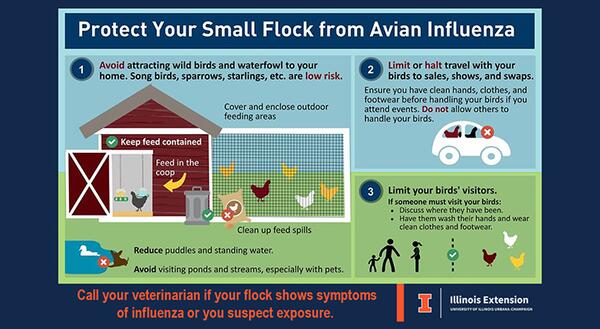
In the past three weeks, Highly Pathogenic Avian Influenza (HPAI) has been detected wild birds in the central U.S. flyway. The HPIA strains being detected are Eurasian H5 and Eurasian H5N1. Confirmed cases of HPIA have been confirmed in commercial and small flocks in Indiana, Iowa, Kentucky and Michigan, so far none in Illinois.
Protecting your Flock
First, keep infected wild waterfowl (ducks and geese) and gulls from interacting with your poultry flock. Avian flu circulates in the wild waterfowl and gull populations without affecting them, yet it is deadly to domestic poultry flocks. It is important to separate your birds from the wild birds. Using enclosed outdoor areas and shelters will allow your birds to have some outdoor time without the risk of coming in contact with possibly infected wildlife or wild birds.
Next, make sure that wild birds do not have access to your flocks feeders and waterers. Keep the poultry coop clean to reduce the risk of your birds coming in contact with their waste.
Any new birds being brought on your property should be kept separate from the flock for 30 days to ensure that they are healthy and disease-free. Any crates or cages that have been off the farm should be disinfected before using. It is recommended not to share equipment with neighbors until the current avian flu situation has passed.
Resources
If you are looking for more information on Highly Pathogenic Avian Influenza, here are a couple very helpful places to go. The Avian Influenza site of the USDA, Animal and Plant Health Inspection Service has links to information on 2022 detections and Defend the Flock program. The University of Minnesota Extension – Avian Influenza site has information for all types of small producers: pastured and organic flocks as well as the urban and backyard ones.
During the last HPIA outbreak in the Midwest, Dr. Ken Koelkebeck, University of Illinois Extension Poultry Specialist, gathered together three very helpful publications from the University of Minnesota and those are available by sending an email to me or visiting the U of Minnesota website noted above.